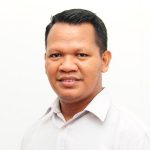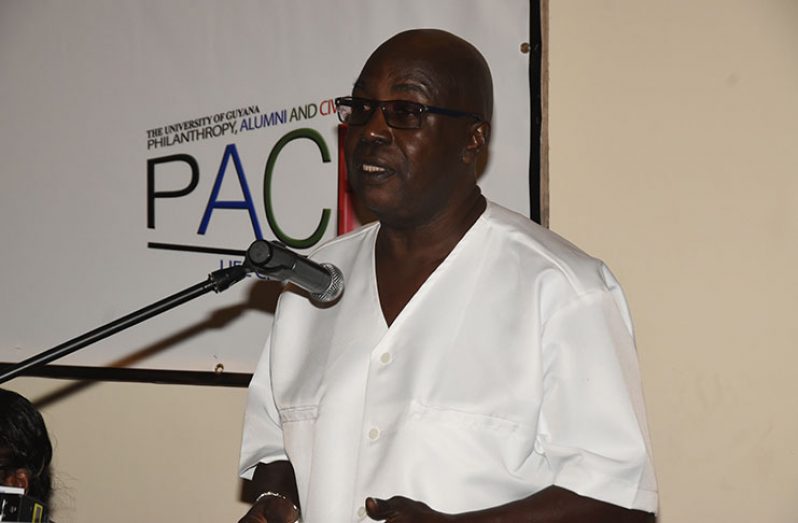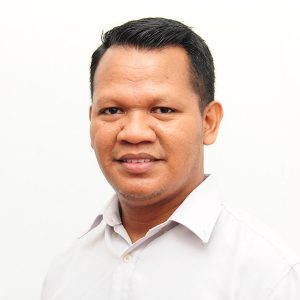…Ed Caesar tells UG forum
THE use of mobile phones in schools as an education delivery tool was one of several suggestions which came to the fore on Wednesday evening at the University of Guyana Turkeyen and Tain Talks.
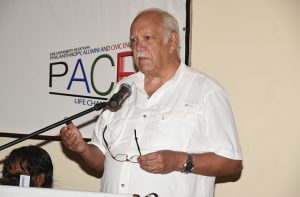
The event was held at the Pegasus Hotel under the theme,” Education as freedom: Education Reform & Socio-Economic Development in Guyana.” Speaking to a gathering which included academics and other members of the public, former Chief Education Officer, Ed Caesar told the audience that the system of reform requires creativity. To this end he recalled that the education ministry had placed a ban on the use of mobile phones in schools.
He said that speaking about the subject of reform, “the time has come for us to train our teachers, how to first of all use the cell phone to do academic work.” Caesar said having achieved this step, the students can then be trained to use the device as a learning tool to undertake additional work in the classrooms. “Don’t let us remove from them something that they like; let us use what they like to teach them,” Caesar said.
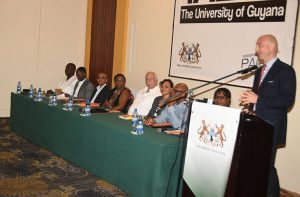
During his presentation, Caesar, who is the chair of the Education Reform Commission, also called on the powers that be to consider those persons who are born with various forms of disabilities in plans for the reformation of the sector. He said that if a method is not found to make such persons resourceful, much more will be have to be done in the future to make them comfortable and live the good life. He said that the sector at all levels “has to find a way to craft and create programmes that will be relevant to the challenge.”
Caesar noted too that the time has come for extensive manpower and community surveys. He elaborated that education training has to be more specific, deliberate and relevant. He spoke of the government’s Hinterland Employment and Youth Service (HEYS) programme, one which he termed successful, noting that young persons were trained to “do things which are relevant to their communities.”
Chief Education Officer, Marcel Hutson told the gathering that the ministry has started to engage stakeholders in improving the quality of education at various levels. He said the country’s education system can be best described as a “work in progress”, noting that the ministry is cognizant of the fact that it still has a far way to go in enhancing the sector.
Hutson also pointed to the need for support from all concerned in bettering the sector. “Any attempt at reformation without a holistic approach will not get very far,” he said, as he cited the need for partnerships. Deputy Representative of the United Nations Children Fund (UNICEF) office in Guyana and Suriname, Paolo Marchi also underscored the importance of education reform. He said that the quality of education is an essential block in the sector.
Panelists during their contributions spoke of reformation of the sector. Businessman, Christopher
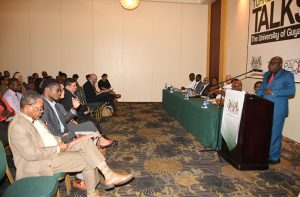
Fernandes speaking in his capacity as chair of the board of the Saint Stanislaus College, called for the improvement in remuneration for teachers. Noting that there is no “short-term fix” to the education system, Fernandes said that while the oil industry can greatly enhance the country’s economic welfare, there is need for competent, educated and well trained human resources to properly utilize the capital which is likely to be made available in the future.
Fernandes said that a start can be made by attracting better qualified candidates into the teaching profession. ”This can only be done by making the teaching profession attractive enough to encourage the bright young minds on leaving school to consider a career in teaching as an attractive option,” he said. He suggested that one step the authorities can make is to make the remuneration of trained, qualified teachers be free of income tax with certain conditions such as having attained certain levels of qualification. In addition, he
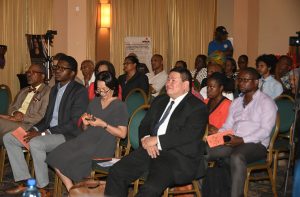
suggested that duty-free entitlement can be made available to teachers at the end of a determined period, a suggestion which also drew applause from the audience. Housing concessions and extending the age of retirement of teachers were also recommendations which Fernandes brought to the table. The forum also saw presentations from Professor Michael Scott, the current Deputy Vice-Chancellor, Academic Engagement at UG; as well as Dr David Singh , Vice President –conservation International Guyana; Guyana Teachers Union representative, Coretta McDonald; National Science Coordinator , Petal Punalall-Jetoo and Joel Simpson of the Guyana Equality Forum.



.jpg)


